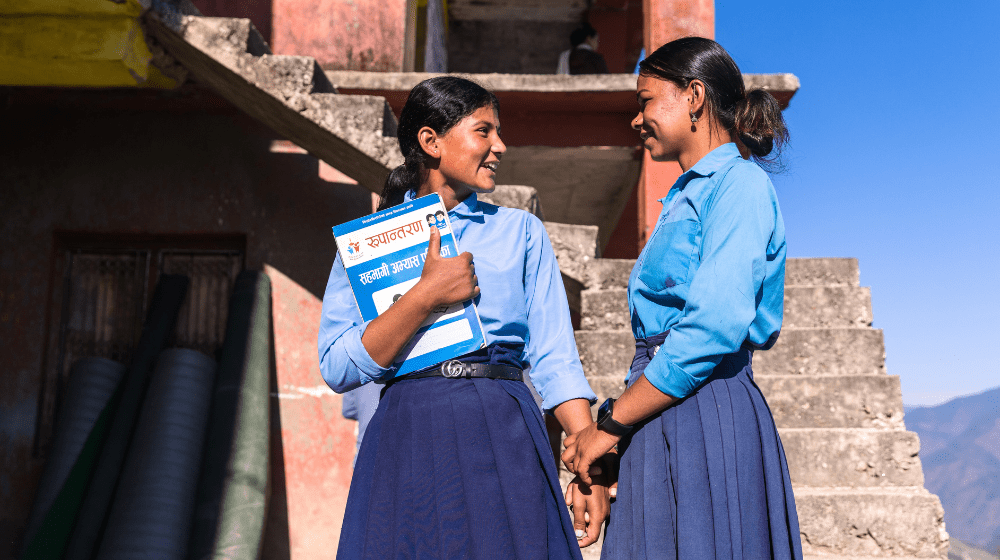In Nepal, girls continue to endure the weight of centuries-old harmful practices and traditions which stem from prevalent discriminatory social norms. This persistent discrimination infiltrates every facet of their lives, from employment opportunities to healthcare and education. Societal norms valuing girls less than boys, further deny them safe spaces to discuss essential topics like menstruation and bodily changes, impeding their rights.
The situation escalated with the onset of the COVID-19 pandemic. Families, grappling with deepening poverty due to job losses and recurring lockdowns, saw child marriage as a desperate means of financial stability.
Take the case of 17-year-old Jyoti Paswan, a resilient young girl from the Terai region, where child marriage is widely prevalent and is a major concern. Despite her dreams and aspirations, her education was abruptly halted when her parents decided to marry her off.
“I want to learn and continue my studies,” she pleaded desperately. “I am not interested in marriage right now. I am way too young.”
Child Marriage
Jyoti's tale is not an isolated one. In fact, Nepal stands as a stark example, ranking second in South Asia for child marriage prevalence. 35% of women aged 20-24 in Nepal were married before 18, which means 1 in 3 women in Nepal marry as children (NDHS 2022). This is a slight decrease compared to 40% in the 2016 NDHS.
This statistic isn't just a number—it's a call to action, a plea for change.
Child marriage is illegal in Nepal and has been since 1963. Under the law, adults and family members who arrange marriages of children, and religious leaders who perform child marriages are all committing crimes and are subject to prosecution. Despite the penalties stipulated in the Criminal Code Act, child marriages continue.
Equipped with this legal knowledge, Jyoti pushed back on her parents’ demand. Initially Jyoti was afraid to reason with her parents but having attended the Rupantaran sessions facilitated for out-of-school girls under the *UNFPA-UNICEF Global Programme to End Child Marriage, Jyoti developed the courage to push back. She also explained the legal provisions of child marriage, and with the support of her two brothers, Jyoti finally succeeded in convincing her parents.
Rupantaran - ‘Transformation’
The Rupantaran programme, developed by the Ministry of Women, Children and Senior Citizens with support from UNFPA, UNICEF and other partners, includes 9-months of sessions covering 15 modules of practical life skills and knowledge on gender equality and human rights (including child marriage related information), reproductive health, gender-based violence, nutrition, communication skills, and decision making among others. The programme also targets the parents of the adolescents which is a huge step in educating families about promoting positive attitudes, empowering girls to direct their own futures, and helping families understand and challenge gender biases that fuel harmful practices against girls.
Most importantly, it also provides a platform and safe space for adolescents of all backgrounds and walks of life, to learn about important matters that affect their sexual and reproductive health and rights.
“I learnt about child marriage and other harmful practices, communication skills, gender-based violence and about my sexual and reproductive health and rights. These sessions really helped me to build my confidence to speak up.”
Passionate to do more, girls like Jyoti go on to serve as staunch advocates to call for an end to child marriage. They facilitate peer groups, Rupantaran sessions, and also lobby for more to be done at local government level to raise more awareness about this harmful practice.
Voices like that of Jyoti, can be very influential in inspiring change using a bottom-up approach to ultimately ensure that the rights of women and girls are upheld in Nepal.
Call to action
Jyoti and other girls like her are also an inspiration personally to me, as it reminds me of my own daughters. As a father I want them to be heard, I want them to excel and most importantly, I want them to be a beacon of hope to all other young girls. This is my hope not just for my girls but for every girl in Nepal.
As October marks International Day of the Girl Child 2023, it is a reminder that we have a long way to go to make this a reality for all girls. Let’s work together to shape a world where all girls enjoy their full childhood. They must play, laugh, go to school, study and experience life as a child and free to be themselves.
After all, they are way too young to get married!
*The UNFPA-UNICEF Global Programme to End Child Marriage promotes the rights of adolescent girls to avert marriage and pregnancy, and enables them to achieve their aspirations through education and alternative pathways such as through the Rupantaran sessions. The Global Programme, which will enter Phase III in 2024, is supported by the Governments of Belgium, Canada, Italy, the Netherlands, Norway, and the United Kingdom, the European Union and Zonta International.
This Opinion-Editorial is authored by Dr. Bashir Najeeb, the United Nations Population Fund (UNFPA) Deputy Representative for Nepal, commemorating International Day of the Girl Child 2023.


